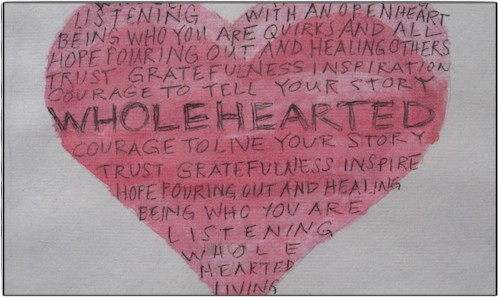
I have written plenty in the past year on mindful eating and how one can learn about their relationship to food””why they are eating and how they use food other than for physical nourishment. As I have described in previous posts, determining why we are eating and checking in while eating to determine our level of hunger, is a key component in eating well. However, mindful eating can appear limiting if we understand eating as an act reserved only to nourish ourselves physically. I refer to eating for mind, body and spirit as True To Yourself Eating. I feel it more accurately describes and addresses the complex relationship that human beings have with food.
True to Yourself Eating understands that our relationship to food goes deeper than survival. It means eating compassionately, joyfully, mindfully””with all of our senses: eyes, ears, nose, mouth, texture and soul. Wholehearted is defined as unstinted devotion, commitment and unreserved enthusiasm. The cult of YOYO dieting is evidence enough that eating with restriction, criticism and guilt does not work. Eating needs to be approached with compassion and awareness as well as adventure and enthusiasm. After all food is one of life’s simple, yet greatest pleasures.
Where we have gone wrong is striking the balance. What is needed is to learn to eat mindfully and wholeheartedly. We need to re-learn how to nourish ourselves on all levels. Going to war with food does not work. Dieting, then binging does not work, and nor does restriction or feeling virtuous because only ate celery sticks for movie night.
As opposed to being an impossible task in perfection, eating well is a practice. This is what I have referred to in the past as “˜practice-not-perfection’ eating. We need to bring a committed kindness to our dinner table more than rules and competition””even if it is only towards ourselves. Sasha T. Loring in Eating with Fierce Kindness, describes self-compassion as “forming a firm, comforting and consistent attitudinal foundation that allows for a caring stance when times are tough”(9)
 Feelings of discouragement and hopelessness when we make efforts for change are part of any transition. All of these experiences are within the scope of being human. Instead of berating ourselves for our humanness we need to honor ourselves with kindness and continue on our adventure.
Feelings of discouragement and hopelessness when we make efforts for change are part of any transition. All of these experiences are within the scope of being human. Instead of berating ourselves for our humanness we need to honor ourselves with kindness and continue on our adventure.
Shame and guilt have no place in fostering a wholehearted relationship to food. Eating is a social, cultural, emotional and soulful experience. If we deny any of these truths, then we are denying ourselves a fully human experience. Restriction may work for a time, but in the end we destine ourselves to failure in eating well””in eating wholeheartedly.
We knew how to eat when we were babies. No matter how tasty the food, when we were full, we stopped. This is called intuitive eating. Many of us are cut off from our body’s signals. We either don’t listen to them or our body doesn’t even send signals anymore because we long ago shut it down. This is where the wisdom of mindful eating comes in and why re-learning to eat mindfully comes first. Learning to eat wholeheartedly follows. We learn to indulge our desires in a healthy and meaningful way so that we do not feel deprived or disconnected from our inner child and from the experience of sharing food in a social context. True to Yourself Eating means you make choices that are aligned you–whether that is indulging in a piece of cake or choosing not eat sugar or gluten or dairy or all of the above. We design our relationship to food and eating around our needs rather than the restrictions or pressure of others. Learning to eat in a way that is aligned with our needs teaches us to have the confidence to be brave enough to be our unique selves.
True To Yourself Eating means bringing awareness to our eating patterns, body sensations, emotions and to eliminate or reduce fixed and undesirable patterns such as emotional or mindless eating. It does not stop at awareness or understanding our emotional eating triggers. It also has an entirely practical component which often goes unaddressed in both traditional diet programs as well as purely mindfulness based eating.
Wholehearted Eating recognizes that after we have shed light onto our eating we still need the everyday strategies and tools to address how to eat for optimal physical and mental health. It offers alternatives to coping with the stresses that trigger us into mindless eating as well as strategies to ensure we create situations and a personal environment in which we are able to eat well and with pleasure. Wholehearted Eating holds the potential to transform our relationship with food because it aligns with the French philosophy that eating is a pleasurable experience and indulgence is a part of our human experience. Self-compassion or what Sasha T. Loring refers to as “˜eating with fierce kindness’ is at the heart of Wholehearted Eating.
 Eating is a complex relationship with many layers that originate all the way back to when we were babies and our mother’s first act of love came in the form of food. This is why overeating can often be a more challenging addiction than alcoholism and gambling. Your Best Body & Brain Weight Loss is a program in eating psychology. It is not a quick fix, but it can offer the stepping stones for the potential to finally heal your relationship with food as you understand that your relationship to food and eating is a reflection of your relationship to yourself, to life and some believe even to God.
Eating is a complex relationship with many layers that originate all the way back to when we were babies and our mother’s first act of love came in the form of food. This is why overeating can often be a more challenging addiction than alcoholism and gambling. Your Best Body & Brain Weight Loss is a program in eating psychology. It is not a quick fix, but it can offer the stepping stones for the potential to finally heal your relationship with food as you understand that your relationship to food and eating is a reflection of your relationship to yourself, to life and some believe even to God.
